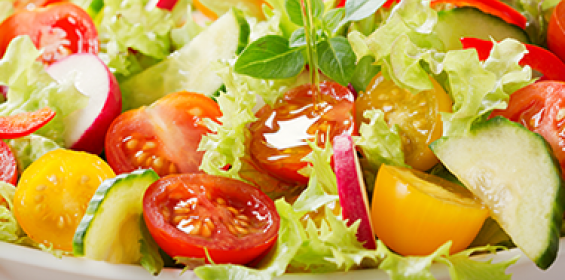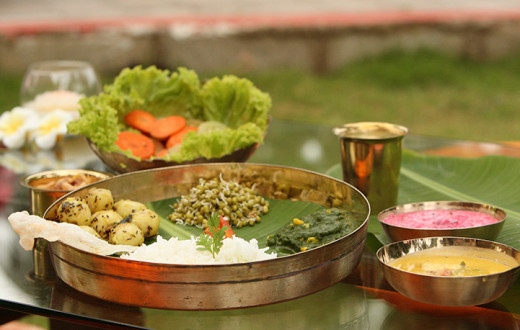We live in times when start-ups are perfecting their variants of mock meat, plant-based burgers and lab-grown meatballs. Yet, the debate of a vegetarian v/s non-vegetarian diet carries on unabated. Everybody is ready to take a stand and defend it wholeheartedly (and heatedly!)
Join a Free workshop on Yoga, Meditation and Breath
Why is there a great shift towards vegetarianism today? It could be for a variety of reasons:
- Some want to benefit from the health advantages of a vegetarian diet
- Others are driven by their conscience regarding animal cruelty
- Some others worry about the impact on the environment and economy
- Few believe in non-violence

Whatever the motivation may be, vegetarianism is an essential part of our development as sensitive human beings. Food plays a vital role in deciding the quality of our life and our relationship with the environment, people and creatures around us.
Will a vegetarian diet give me all the required nutrients?
This issue is at the heart of the vegetarian v/s non-vegetarian debate. The answer is a resounding yes!
Meat-eaters believe they need the nutrients a non-vegetarian diet provides to be hale and hearty. They worry that a vegetarian diet will not nourish and keep them healthy. On the contrary, a balanced vegetarian diet provides more nutritional energy than meat. For example, legumes and beans contain a sizeable amount of protein that is easier to digest than the protein in meat.

CONSIDER
Fibre-rich content of a vegetarian diet improves digestion and elimination; it also prevents the synthesis of very low-density lipoproteins that lead to heart diseases.
A vegetarian diet contains sattvic foods that increase your prana or energy levels.
Fruits, vegetables, grains and pulses are storehouses of solar energy.
Vegetarian food, generally, digests within 2-6 hours.
A diet rich in fruits, vegetables and grains, lower in fat and higher in fibre, is good for the heart and body.
All the nutrients you need to be healthy and live well are there for all to see. Essentially, you get:
- Carbohydrates from grains
- Proteins from legumes and nuts
- Vitamins from fruits and vegetables
- Calcium from dark greens like kale and spinach
- Fat from nuts and fruits
- Essential amino acids from green leaves
- Omega 3 from walnuts
- Vitamin B12 from dairy products, foods fortified with it such as breakfast cereals and supplements
- Vitamin D from foods fortified with it, almond milk, and the Sun
To present a balanced view on the debate, let’s look at all the sides.
Impact of a non-vegetarian diet
(1) Health
Health professionals advise reducing animal products in our diet to reduce the risk of diabetes, heart disease, and hypertension. A vegetarian diet, drastically, reduces the absorption of fats from food, and the build-up of cholesterol that leads to obesity, hypertension, heart ailments, strokes and other diseases.
CONSIDER
Meat-eating animals have long, sharp, and pointed teeth needed to tear meat. Humans don’t.
Carnivores have short intestinal tracts - three times their body length to enable meat (which decays fast) to leave the body quickly. Humans have intestinal tracts 10-12 times their body length. As it takes 36-72 hours for the meat to be completely digested, it is not healthy for it to be inside our body for so long.
Most flesh foods have excess protein leading to kidney disease and high blood urea; uric acid deposits in the muscle fibres of meat are tough to eliminate. Animals have proportionally larger livers which can neutralize this uric acid.
The terror experienced by the animal at the time of slaughter induces the secretion of toxic substances that we consume.
Red meat contains a high amount of saturated fat that increases cholesterol levels.
Non-vegetarian food is either rajasic or tamasic, and hence not fresh.

(2) Environment
The environmental and economic cost of feeding and breeding livestock is so high that it makes sense to adopt a vegetarian diet. Consider the impact on our resources.
A) Water
Statistics vary across the world, but without a doubt, the water required to raise animals for food far exceeds the water used for domestic purposes. With scanty rainfall, dropping water tables and drying wells, water spent on maintaining animals for food is wasteful. Substituting this with a plant-based diet will help conserve water.

B) Soil
Livestock reared for meat value require extensive grasslands to graze. Here are some of the consequences:
- Trees are cut to make way for pastures. Deforestation displaces various animal and bird species and reduces the oxygen supply in the air.
- Excessive grazing makes the land dry.
- Thoughtless farming of grains as fodder also leads to the erosion of topsoil by wind and rain.
- Mismanagement of animal waste has also resulted in air contamination, change in the ph of our water, and global warming.
- Meat production is less economical and less beneficial to the environment. To produce one pound of meat, a large amount of grass, cereals and water is fed to the livestock. Additionally, an area of land that will produce 1 ton of beef will produce 10 to 20 tons of nutritious vegetarian crops.
An Oxford University research found that cutting meat and dairy products from a diet could reduce an individual's carbon footprint from food by up to 73%!
All this can be avoided with a simple change in diet!
Vegetarianism & the practice of yoga
Every day, scientists discover just how connected we are with everything and everyone around us. All of us are made up of atoms, particles, quarks and strings connecting us, as energy or being, at all levels of existence. When you broaden your awareness and, hence compassion, you recognize this relationship. Perfecting this relationship is yoga.

Killing or harming others, for whatever purpose, separates and disconnects us from this feeling of oneness. Ethical objections to eating animals are generally of two kinds:
- Opposition to the act of killing itself
- Killing is, intentionally, causing the death of a living organism. This is the ultimate act of violence, or himsa and, diametrically, opposed to the goal of reducing suffering, which is one of the basic tenets and character-building aspects of a yoga practitioner.
- If you have ever loved an animal, you will acknowledge that they possess a range of emotions, and are capable of love. Vegetarianism honours and respects these feelings, and supports the rights of animals.
Curiously, the main animals that are eaten are vegetarians themselves! This makes it doubly cruel to harm such harmless creatures.
Food and the mind
Yoga categorises food as sattvic, rajasic and tamasic.
Yogic wisdom teaches us that food affects, both, the body and the mind. So, with our diet, we can influence our minds, perception and, hence, actions.
‘Vinapi bheshajair vyadhi pathyadeva nivarthathe; Na tu pathyaviheenasya bheshajaanaam shatairapi’.
One can eliminate disease just by following an appropriate diet and lifestyle, even without the help of medicines. But, healing is not possible even with proper medicines, if one neglects the aspect of food and routine.
A diet high in light, easily digestible foods is great for the body, mind and the planet. While we don’t know future food trends, there could come a time when animal meat will be a thing of the past. Until plant-based patties become trendier, let’s make more conscious food choices, and try going vegetarian.
(Written with inputs from Kaushani Desai, Ayurvedic cooking expert, The Art of Living)
































